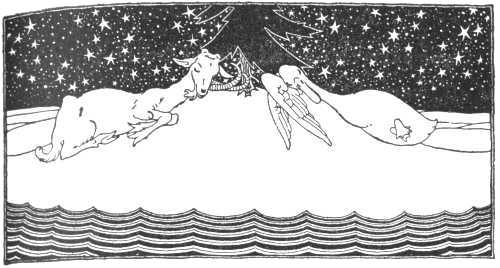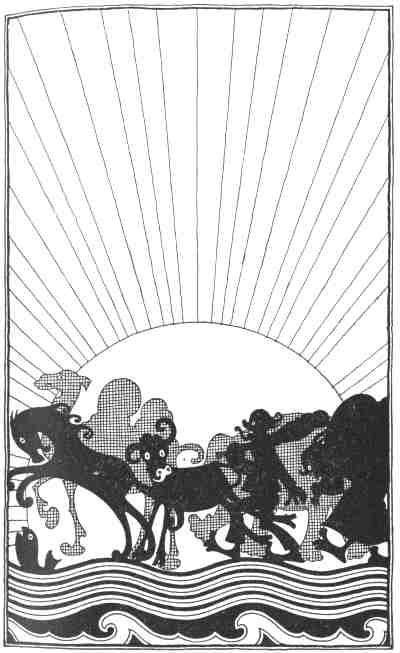
Sand Flat Shadows
Fire the Goat and Flim the Goose slept out. Stub pines stood over them. And away up next over the stub pines were stars.
It was a white sand flat they slept on. The floor of the sand flat ran straight to the Big Lake of the Booming Rollers.
And just over the sand flat and just over the booming rollers was a high room where the mist people were making pictures. Gray pictures, blue and sometimes a little gold, and often silver, were the pictures.
And next just over the high room where the mist people were making pictures, next just over were the stars.192
Over everything and always last and highest of all, were the stars.
Fire the Goat took off his horns. Flim the Goose took off his wings. “This is where we sleep,” they said to each other, “here in the stub pines on the sand flats next to the booming rollers and high over everything and always last and highest of all, the stars.”
Fire the Goat laid his horns under his head. Flim the Goose laid his wings under his head. “This is the best place for what you want to keep,” they said to each other. Then they crossed their fingers for luck and lay down and went to sleep and slept. And while they slept the mist people went on making pictures. Gray pictures, blue and sometimes a little gold but more often silver, such were the pictures the mist people went on making while Fire the Goat and Flim the Goose went on sleeping. And over everything and always last and highest of all, were the stars.
They woke up. Fire the Goat took his horns 193out and put them on. “It’s morning now,” he said.
Flim the Goose took his wings out and put them on. “It’s another day now,” he said.
Then they sat looking. Away off where the sun was coming up, inching and pushing up far across the rim curve of the Big Lake of the Booming Rollers, along the whole line of the east sky, there were people and animals, all black or all so gray they were near black.
There was a big horse with his mouth open, ears laid back, front legs thrown in two curves like harvest sickles.
There was a camel with two humps, moving slow and grand like he had all the time of all the years of all the world to go in.
There was an elephant without any head, with six short legs. There were many cows. There was a man with a club over his shoulder and a woman with a bundle on the back of her neck.
And they marched on. They were going 194nowhere, it seemed. And they were going slow. They had plenty of time. There was nothing else to do. It was fixed for them to do it, long ago it was fixed. And so they were marching.
Sometimes the big horse’s head sagged and dropped off and came back again. Sometimes the humps of the camel sagged and dropped off and came back again. And sometimes the club on the man’s shoulder got bigger and heavier and the man staggered under it and then his legs got bigger and stronger and he steadied himself and went on. And again sometimes the bundle on the back of the neck of the woman got bigger and heavier and the bundle sagged and the woman staggered and her legs got bigger and stronger and she steadied herself and went on.
This was the show, the hippodrome, the spectacular circus that passed on the east sky before the eyes of Fire the Goat and Flim the Goose.
“Which is this, who are they and why do they come?” Flim the Goose asked Fire the Goat.195
Away off where the sun was coming up, there were
people and animals
197
“Do you ask me because you wish me to tell you?” asked Fire the Goat.
“Indeed it is a question to which I want an honest answer.”
“Has never the father or mother nor the uncle or aunt nor the kith and kin of Flim the Goose told him the what and the which of this?”
“Never has the such of this which been put here this way to me by anybody.”
Flim the Goose held up his fingers and said, “I don’t talk to you with my fingers crossed.”
And so Fire the Goat began to explain to Flim the Goose all about the show, the hippodrome, the mastodonic cyclopean spectacle which was passing on the east sky in front of the sun coming up.
“People say they are shadows,” began Fire the Goat. “That is a name, a word, a little cough and a couple of syllables.198
“For some people shadows are comic and only to laugh at. For some other people shadows are like a mouth and its breath. The breath comes out and it is nothing. It is like air and nobody can make it into a package and carry it away. It will not melt like gold nor can you shovel it like cinders. So to these people it means nothing.
“And then there are other people,” Fire the Goat went on. “There are other people who understand shadows. The fire-born understand. The fire-born know where shadows come from and why they are.
“Long ago, when the Makers of the World were done making the round earth, the time came when they were ready to make the animals to put on the earth. They were not sure how to make the animals. They did not know what shape animals they wanted.
“And so they practised. They did not make real animals at first. They made only shapes of animals. And these shapes were shadows, 199shadows like these you and I, Fire the Goat and Flim the Goose, are looking at this morning across the booming rollers on the east sky where the sun is coming up.
“The shadow horse over there on the east sky with his mouth open, his ears laid back, and his front legs thrown in a curve like harvest sickles, that shadow horse was one they made long ago when they were practising to make a real horse. That shadow horse was a mistake and they threw him away. Never will you see two shadow horses alike. All shadow horses on the sky are different. Each one is a mistake, a shadow horse thrown away because he was not good enough to be a real horse.
“That elephant with no head on his neck, stumbling so grand on six legs—and that grand camel with two humps, one bigger than the other—and those cows with horns in front and behind—they are all mistakes, they were all thrown away because they were not made good enough to be real elephants, real cows, real 200camels. They were made just for practice, away back early in the world before any real animals came on their legs to eat and live and be here like the rest of us.
“That man—see him now staggering along with the club over his shoulder—see how his long arms come to his knees and sometimes his hands drag below his feet. See how heavy the club on his shoulders loads him down and drags him on. He is one of the oldest shadow men. He was a mistake and they threw him away. He was made just for practice.
“And that woman. See her now at the end of that procession across the booming rollers on the east sky. See her the last of all, the end of the procession. On the back of her neck a bundle. Sometimes the bundle gets bigger. The woman staggers. Her legs get bigger and stronger. She picks herself up and goes along shaking her head. She is the same as the others. She is a shadow and she was made as a mistake. 201Early, early in the beginnings of the world she was made, for practice.
“Listen, Flim the Goose. What I am telling you is a secret of the fire-born. I do not know whether you understand. We have slept together a night on the sand flats next to the booming rollers, under the stub pines with the stars high over—and so I tell what the fathers of the fire-born tell their sons.”
And that day Fire the Goat and Flim the Goose moved along the sand flat shore of the Big Lake of the Booming Rollers. It was a blue day, with a fire-blue of the sun mixing itself in the air and the water. Off to the north the booming rollers were blue sea-green. To the east they were sometimes streak purple, sometimes changing bluebell stripes. And to the south they were silver blue, sheet blue.
Where the shadow hippodrome marched on the east sky that morning was a long line of blue-bird spots.202
“Only the fire-born understand blue,” said Fire the Goat to Flim the Goose. And that night as the night before they slept on a sand flat. And again Fire the Goat took off his horns and laid them under his head while he slept and Flim the Goose took off his wings and laid them under his head while he slept.
And twice in the night, Fire the Goat whispered in his sleep, whispered to the stars, “Only the fire-born understand blue.”